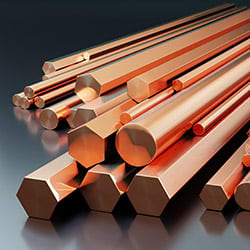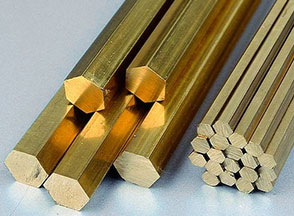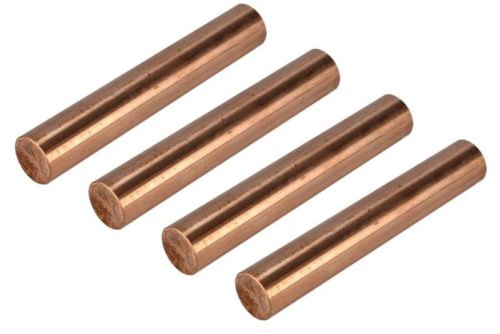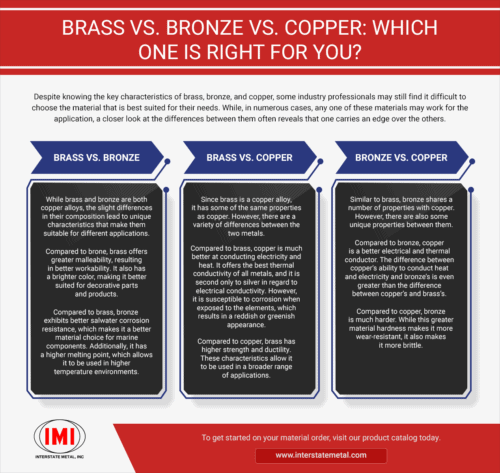
At Interstate Metal, we are a premier manufacturer and distributor of brass, bronze, and copper alloys. While these metals have many of the same characteristics due to their similar constituents, they also have distinct properties that can make one better suited for a particular application over the others. Our material experts have put together the following guide on brass, bronze, and copper, including what they are made of, key characteristics, typical applications, and alloys we offer, to help readers identify which one is right for their needs.
What Are the Different Types of Alloys?
Copper, brass, and bronze are often referred to as “red metals” due to their reddish color. While copper is an element (i.e., a pure substance made from one type of atom), brass and bronze are made from combinations of elements. Brass primarily consists of copper and zinc, while bronze primarily consists of copper and tin. Below, we provide an overview of each of these three metals.
Brass
What Is Brass?

As a copper alloy, brass exhibits many of the same material properties as copper. However, it does have some distinct properties, such as:
Applications of Brass Alloys
Brass is commonly used for decorative applications since it has a gold-like appearance. However, its excellent manufacturability enables it to be used for various functional components as well. Typical applications for this material include:
- Architectural elements
- Casings
- Electronics
- Musical instruments
- Plumbing
Our Brass Alloy Products
At Interstate Metal, we carry the following brass bar alloys:
- C26000
- C26800
- C27200
- C33000
- C36000
- C38500
- C46400
They are available in round bar, hexagon bar, rectangular bar, and square bar forms, as well as brass lead free bars. In, we offer brass tube, brass sheet, and brass coil.
Bronze
What Is Bronze?
Bronze is an alloy of copper, tin, and various amounts of other elements. Similar to brass, the addition of other elements improves the strength of the base copper compound.
While bronze shares many properties with brass and copper (e.g., corrosion resistance and low coefficient of friction), it also exhibits some unique characteristics, such as:
- Higher melting point than brass
- Greater brittleness
Applications of Bronze Alloys
Due to its dull gold color, bronze is commonly used for the following applications:
- Awards
- Musical instruments
- Sculptures
Its hardness and corrosion resistance also make it suitable for use in marine parts and products, such as:
- Boats and ships
- Dock equipment components
Its low coefficient of friction makes it ideal for various industrial components, such as:
- Bearings
- Bushings
Our Bronze Alloy Products
At Interstate Metal, we carry the following bronze alloys in round bar form:
- C510
- C544
- C630
- C642
- C655
- C673
- C863
- C932
- C954
- SAE841
- SAE863
Copper
Applications of Copper Alloys
Copper is used for a wide range of industrial applications, including:
Our Copper Products
At Interstate Metal, we carry two types of copper:
- ETP C11000 (Electrolytic Tough Pitch Copper)
- C12200 (Deoxidized High Phosphorus Copper)
They are available as plates, sheets, bars, bus bars, pipes, tubes, and WROT and press fittings. Our bars are offered in copper round bar, copper rectangle bar, and copper square bar configurations.
Brass vs. Bronze vs. Copper: Which One is Right for You?
Despite knowing the key characteristics of brass, bronze, and copper, some industry professionals may still find it difficult to choose the material that is best suited for their needs. While, in numerous cases, any one of these materials may work for the application, a closer look at the differences between them often reveals that one carries an edge over the others.
-
Brass vs. Bronze
While brass and bronze are both copper alloys, the slight differences in their composition lead to unique characteristics that make them suitable for different applications.
Compared to bronze, brass offers greater malleability, resulting in better workability. It also has a brighter color, making it better suited for decorative parts and products.
Compared to brass, bronze exhibits better saltwater corrosion resistance, which makes it a better material choice for marine components. Additionally, it has a higher melting point, which allows it to be used in higher temperature environments. -
Brass vs. Copper
Since brass is a copper alloy, it has some of the same properties as copper. However, there are a variety of differences between the two metals.
Compared to brass, copper is much better at conducting electricity and heat. It offers the best thermal conductivity of all metals, and it is second only to silver in regard to electrical conductivity. However, it is susceptible to corrosion when exposed to the elements, which results in a reddish or greenish appearance.
Compared to copper, brass has higher strength and ductility. These characteristics allow it to be used in a broader range of applications. -
Bronze vs. Copper
Similar to brass, bronze shares a number of properties with copper. However, there are also some unique properties between them.
Compared to bronze, copper is a better electrical and thermal conductor. The difference between copper’s ability to conduct heat and electricity and bronze’s is even greater than the difference between copper’s and brass’s.
Compared to copper, bronze is much harder. While this greater material hardness makes it more wear-resistant, it also makes it more brittle.


